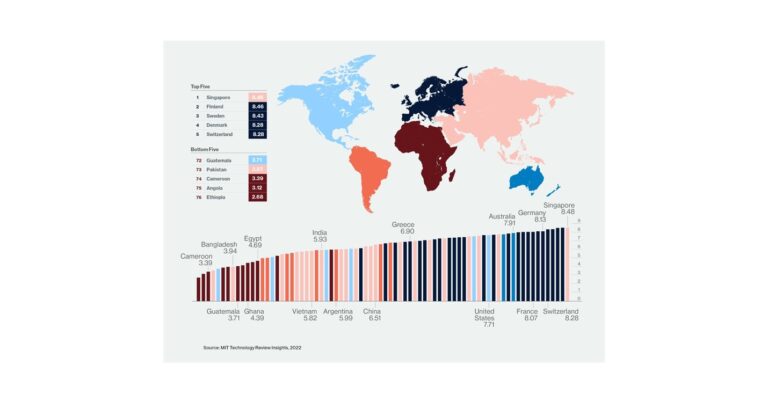
The cloud has become a foundational part of nearly every national economy’s journey toward enhanced productivity. “Today, we see that cloud is computing. Cloud and cloud-led innovation are foundational for businesses and governments in driving enterprise and economic growth,” says Elizabeth Bramson-Boudreau, CEO and publisher of MIT Technology Review.
Based on research conducted between November 2021 and February 2022, the interactive Index shows which countries are progressing fastest in global efforts to adopt and deploy cloud computing services. The Index reveals Singapore has the highest score (8.48/10) for overall cloud innovation. Next ranked were Finland (8.46/10) and Sweden (8.43/10).
The key findings of this report are as follows:
- Global Cloud Ecosystem Index leaders combine digital infrastructure and governance leadership. Singapore leads, followed by European countries seeking to preserve the rights of digital consumers and to curb monopolistic tendencies of the internet services sector.
- Fast-evolving digital infrastructure is foundational for a nation’s cloud capabilities. The top three overall Index leaders—Singapore, Finland, and Sweden—all have one thing in common: they rely on copious and reliable broadband and a reasonable density of secure servers and data centers to underpin successful cloud computing capabilities.
- Enter the ecocycle. There is a virtuous cycle—an “ecocycle”—emerging in leading cloud economies as use of scalable and distributed computing resources increases by consumers and businesses which drastically reduces “digital waste” and allows organizations to share insights and computing resources more efficiently and reciprocally.
- Bridges, not fortresses. Most cloud-minded governments work to build and promote a “trust infrastructure”—the public policy and regulatory and social conventions that ensure a government’s digital channels are efficient, effective, and secure.
- The cloud as a talent magnet. The top three leaders among emerging economies in the “talent and human affinity” category of the Index—Iran, India, and Vietnam—understand the importance of having skilled workers for implementing infrastructure and process-intensive projects at scale.
“Data gathered from the Global Cloud Ecosystem Index validates that now, more than ever, there is urgency to go to the cloud from both enterprises and policymakers, as cloud can create positive economic impact,” says Ravi Kumar S., president of Infosys. He continues, “The future of work will depend heavily on effective cloud transformations to create a dynamic digital future that uplifts and equalizes us all, ensuring more opportunities for everyone, irrespective of location. Infosys Cobalt is poised to continue playing a key role in building a community through the cloud that nurtures knowledge, assets, and talent to drive innovation.”
To view the research findings, visit the interactive page or click here to download the report.
To learn more about the cloud, visit The cloud hub: From cloud chaos to clarity.
For more information, please contact us at [email protected].
About MIT Technology Review
Founded at the Massachusetts Institute of Technology in 1899, MIT Technology Review is a world-renowned independent media company whose insight, analysis, interviews, and live events explore the newest technologies and their commercial, social, and political impacts. MIT Technology Review derives its authority from its relationship to the world’s foremost technology institution and from its editors’ deep technical knowledge capacity to see technologies in their broadest context and unequaled access to leading innovators and researchers. Insights, MIT Technology Review’s custom publishing division, conducts research worldwide and publishes a wide variety of content, including articles, reports, and podcasts.
Contact:
Laurel Ruma
[email protected]
SOURCE MIT Technology Review Insights
